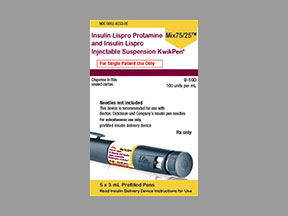
Insulin Lispro Prot & Lispro Coupons & Savings Card – Discount Prices from $24.27
Generic for: Humalog mix 75/25, Humalog mix 50/50, Humalog mix 50/50 kwikpen
My prescription
Edit
3ML of (75-25) 100UNIT/ML, Insulin Lispro Prot & Lispro (1 Pen)
Select pharmacy

CVS
$53.73
COUPON PRICE
Walgreens
$24.27
COUPON PRICE
Walmart
$33.13
COUPON PRICE
Albertsons
$33.22
COUPON PRICEInsulin Lispro Prot & Lispro savings card
Show this card to your pharmacist
Walgreens
$24.27
BIN
ID
PCN
GRP
015995
LHKPX306751
GDC
DR33
Powered by
Price history for Humalog Mix 75/25 (brand) & Insulin Lispro Prot & Lispro (generic)
1 Pen, 3ML of (75-25) 100UNIT/ML
Average retail price for Humalog Mix 75/25
Average retail price for Insulin Lispro Prot & Lispro
Average SaveHealth price for Insulin Lispro Prot & Lispro
Our price history data is based on aggregated prescription data collected from participating pharmacies in America. Our prescription data updates daily to reflect the latest price changes. If you notice a missing data point, it means there wasn't sufficient data available to generate a monetary value for that date.
We analyzed Insulin Lispro Prot & Lispro prices for (3ML of (75-25) 100UNIT/ML, 1 Pen) over the last 12 months. The average retail price was $126.63, while the average price using the SaveHealth discount card was $36.55. That's a savings of approximately 71.14% when using our Insulin Lispro Prot & Lispro coupon.
Compared to the generic version, Humalog Mix 75/25 had an average price of $157.95 over the same time period. With the SaveHealth savings card, Insulin Lispro Prot & Lispro is 76.86% cheaper on average than Humalog Mix 75/25.
*Retail prices are based on pharmacy claims data, and may not be accurate when we don't have enough claims.
Insulin Lispro Prot & Lispro dosage forms
Dosage Quantity Price from Per unit 3ML of (75-25) 100UNIT/ML 1 Pen $25.03 $25.03 3ML of (75-25) 100UNIT/ML 2 Pens $58.07 $29.04 3ML of (75-25) 100UNIT/ML 3 Pens $91.10 $30.37
| Dosage | Quantity | Price from | Per unit |
|---|---|---|---|
| 3ML of (75-25) 100UNIT/ML | 1 Pen | $25.03 | $25.03 |
| 3ML of (75-25) 100UNIT/ML | 2 Pens | $58.07 | $29.04 |
| 3ML of (75-25) 100UNIT/ML | 3 Pens | $91.10 | $30.37 |
